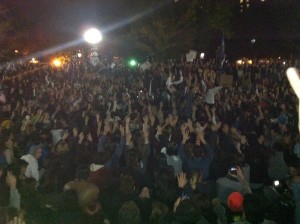10.16.11
Hey y’all,
Like Monte, I made it to the protests in NYC yesterday. I got there on the later side – in time for the rally in Times Square, a “general assembly” meeting in Washington Square Park (see photo below), and a late-night visit to those hunkered down in Liberty Park. Monte’s pictures give you a good idea of the energy and happenings on the street throughout the day. I agree that ALL issues were on the table and there was a growing sense that we’ve collectively reached our breaking point on all of them!
I wanted to share a couple of the conversations I had with some interesting folks throughout the night that are helping me put things in perspective. I’d love to hear what others think…
One conversation I had was down at Zuccotti Park. Lots of residents were already in their sleeping bags for the night, covers pulled over their heads to block the florescent streetlights. I was milling around, ease-dropping on conversations between the kitchen area and the free clothing stand (this little society provides for its citizens!), when a guy called me over to a discussion he was having with two other guys on the pretense that they needed ‘to hear what a white woman thinks about all this.’ His name was Junior*, from South Carolina by way of Bed Stuy, Brooklyn. In his late-20s or 30s, Junior was black, college educated and employed as an ambulance driver (if you have to go to the hospital in NYC, Junior can tell you exactly where you DO NOT want to go to get care). Junior was suspicious of what he saw around him: “I’m just trying to figure out what you people are trying to do here.” The jist of what he said (with a polite warning ahead of time that he ‘has a tendency to over-explain things’) was that he said he pays upwards of 40% of his paycheck for child support, and the rest to taxes. He doubted that if he was richer the government would require him to pay as high a percent of his income in child support as he does now. He wanted to know “Is this movement just about putting unemployed bankers back to work?” Or are poor people who always get the short stick going to benefit too?
Tough question, but important to bring to the forefront, I think. Certainly those who feel most marginalized by the system will not so readily get their hopes up that change will make their lives better too.
And on the opposite side of the spectrum, later that night at an upper-middle class party at a loft in Tribecca I talked with an ex-protester turned banker. Derrick, a tall, white, gay guy in his mid-30s, who had started working as a VP of something at a big bank in the city 11 months ago (He didn’t tell me which bank, but said it had gotten a serious bailout during the financial crisis.) In a previous life he had been a hard-core protester during the Republican National Convention back in 2004, so much so that he was not only arrested for 38 hours, but severely beaten by seven police officers. Soon after, he said he picked up and moved to Portland, but eventually moved back to New York to take this job at a bank. “I didn’t want to be a banker, but I was tired of being unemployed!” A few cocktails in, Derrick was having a bit of an existential crisis: Protesters cheered in the streets below the open window and Derrick wanted to be in the streets too, but felt too uneasy about it given his job. As a gay man and a former activist, he didn’t feel like it was cool for him to be who he is at his job. “I’m not going to go up to my boss and say ‘Ah! I love your suit! [insert flamboyant hand gestures]’.” But he was frustrated by the inequality and excess he saw every day at his office. “My boss makes 8 times what I do, and doesn’t work as hard as I do.” I asked if he wanted to make as much as his bosses, to which he replied, “I’ve heard from HR that some of the higher-ups make 500 million a year.” Pause. “Why does anybody need that much money?” He thought for a second and then said, “I don’t think anybody in this country needs to make more than 2 million a year.”
Derrick’s comment got me thinking about what it means to work in an environment where one has to put aside one’s values and beliefs. How can our society and institutions better empower people to do things they feel good about?
-Adina Matisoff
